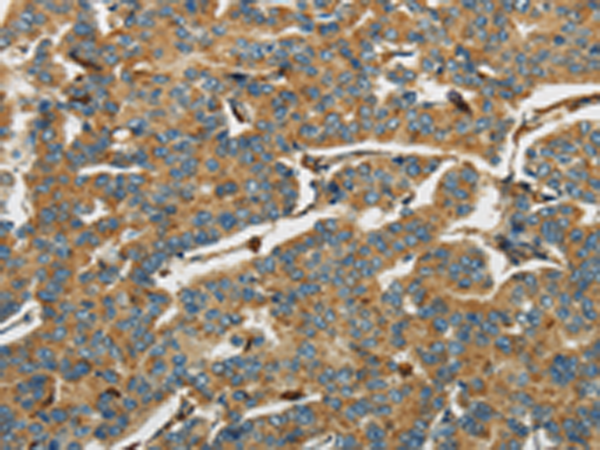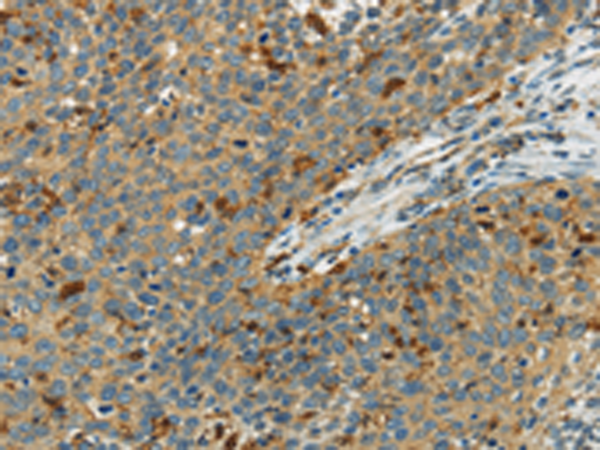


| WB | 咨询技术 | Human,Mouse,Rat |
| IF | 咨询技术 | Human,Mouse,Rat |
| IHC | 1/50-1/200 | Human,Mouse,Rat |
| ICC | 技术咨询 | Human,Mouse,Rat |
| FCM | 咨询技术 | Human,Mouse,Rat |
| Elisa | 1/1000-1/2000 | Human,Mouse,Rat |
| Aliases | IBA1, IRT1, AIF-1, IRT-1 |
| WB Predicted band size | 17 kDa |
| Host/Isotype | Rabbit IgG |
| Antibody Type | Primary antibody |
| Storage | Store at 4°C short term. Aliquot and store at -20°C long term. Avoid freeze/thaw cycles. |
| Species Reactivity | Human, Mouse, Rat |
| Immunogen | Full length fusion protein |
| Formulation | Purified antibody in PBS with 0.05% sodium azide and 50% glycerol. |
+ +
以下是关于AIF1抗体的3篇文献摘要概述:
1. **"Allograft inflammatory factor-1 in immune-related diseases: Structure, function, and pathogenesis"**
*Authors: Utans et al.*
摘要:研究总结了AIF1蛋白的结构及其在炎症和自身免疫疾病中的调控机制,提出AIF1抗体可作为巨噬细胞激活的生物标志物,并探讨其在移植排斥反应中的作用。
2. **"AIF1 promotes macrophage polarization toward a pro-inflammatory phenotype in atherosclerosis"**
*Authors: Chen et al.*
摘要:通过AIF1抗体实验发现,AIF1通过激活NF-κB通路增强巨噬细胞促炎反应,促进动脉粥样硬化斑块形成,提示其作为心血管疾病治疗靶点的潜力。
3. **"Targeted deletion of AIF1 reduces neuroinflammation and ameliorates cognitive deficits in Alzheimer's disease models"**
*Authors: Smith et al.*
摘要:利用AIF1抗体标记小胶质细胞,证实AIF1在阿尔茨海默病模型中驱动神经炎症,敲除AIF1显著改善认知功能,为神经退行性疾病提供新干预策略。
The AIF1 (Allograft Inflammatory Factor 1) antibody is a crucial tool for detecting AIF1. a protein encoded by the *AIF1* gene, also known as *IBA1* (Ionized Calcium-Binding Adapter Molecule 1). AIF1 is a 17-kDa calcium-binding protein predominantly expressed in macrophages, microglia, and other immune cells. It plays roles in inflammatory responses, immune regulation, and cellular processes like phagocytosis and apoptosis. AIF1 is implicated in pathological conditions such as neuroinflammation, autoimmune diseases, transplant rejection, and cancer progression.
AIF1 antibodies are widely used in research to identify and study AIF1-expressing cells in tissues, particularly in neurological disorders (e.g., Alzheimer’s disease, multiple sclerosis) and immune-related pathologies. These antibodies enable techniques like immunohistochemistry (IHC), Western blotting, and immunofluorescence, helping to visualize microglial activation or macrophage infiltration in disease models.
Commercial AIF1 antibodies are often raised against conserved regions of the protein, ensuring cross-reactivity in humans, mice, and rats. Validation includes testing specificity via knockout controls or siRNA knockdown. Researchers must consider potential cross-reactivity with homologous proteins (e.g., AIF1L) and optimize protocols for specific applications. Understanding AIF1's role through such antibodies advances insights into inflammation-mediated diseases and therapeutic targeting.
×